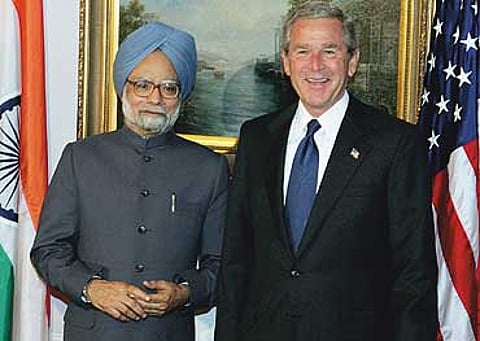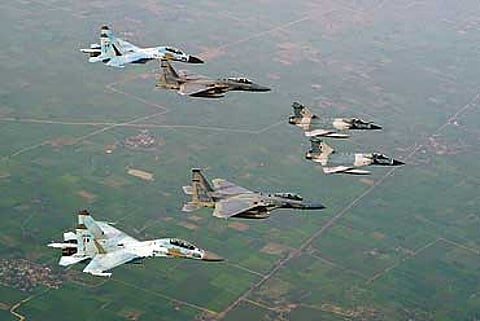India, Big Time
In a bold new policy report, US defence and nuclear expert Ashley J. Tellis says the only option for the Bush administration is to consider India an Asian superpower
The United States must align with India because...
- By 2015, it will have the fourth most capable concentration of power
- It will be among the five major economies in 25-50 years
- Can be a counterfoil to China
- Can stabilise the region littered with failing states
- Help India's power to grow to prevent China's dominance
- End the illusory idea of military balance between India and Pakistan
- Endorse India's membership in the UN Security Council, G-8, APEC, International Energy Agency
- Remove objections to the Iran-India gas pipeline
- Allow sale of dual-use technology, including nuclear safety equipment


But the much-heralded Next Steps in Strategic Partnership (NSSP) was a "precarious" breakthrough, the report says. Bush's second term can make a real difference by demonstrating a true change of the American heart to the people of India. It shouldn't be a teeth-pulling exercise where New Delhi must repeatedly prove its credentials to gain anything. Such an attitude is downright "astrategic". It creates a dangerous situation where the US ends up strengthening China by default purely by denying India the technology it wants.
Instead, Bush should aid the growth of India's national power by augmenting its economic and defence capabilities, not jam the brakes. He must abolish the second-class citizenship, support India's bid for a permanent seat in the UN Security Council, pull India out of the "netherworld" of nuclear technology, offer a defence partnership and share information across the board—political, scientific, technological—to show that New Delhi is a real partner. And end the "illusory criterion of maintaining a military 'balance' with Pakistan—an untenable proposition, given the disparities in national capabilities".

Washington can begin the new era with some simple gestures. It can stop the "gratuitous public statements" demanding India sign the Nuclear Non-Proliferation Treaty as "a non-nuclear weapon state," a formulation that defies logic. It can call off the prosecutors who routinely condemn India's missile research. It can allow other countries to support India's strategic programmes.That's just for starters. The report is a thunderbolt of ideas, a shock wave of innovative solutions. It is backed by meticulous research so those married to the status quo can't yawn or dismiss it.

Bush gets it. But to realise the goal, Bush should "enshrine his intention to advance the growth of Indian power in a formal National Security Decision Directive (NSDD) that provides authoritative guidance for the entire government". In other words, nothing less than a fatwa would push the American babus to move. From the earliest days, US presidents, exercising executive power like that of a monarch, have issued directives establishing new policy. The NSDD can state that since there is an "unassailable" convergence of objectives on defeating terrorism, stopping proliferation, promoting democracy and ensuring a stable balance of power in Asia, the "fundamental strategic interests of the United States require strengthening India, supporting its democratic institutions, and assisting in the growth of its national power, integrating India as a friendly nuclear weapon state into the evolving global regime, pursuing a special relationship with it even though New Delhi continues to remain formally nonaligned...."
The Carnegie report says, "Absent such instruction, it will be difficult to ensure that bureaucratic debates actually advance the president's interests." There should be continuous high-level monitoring if the three dialogues—strategic, energy and economic—are to produce anything besides "lofty rhetoric, full of sound and fury signifying nothing". The dialogue leaders must find ways to treat India as a legitimate exception to the existing rules, specially in the nuclear arena. "Of the three outliers, Pakistan and Israel receive subsidies. Only India is currently outside the circle, yet it is expected to contribute just the same toward the realisation of global non-proliferation goals. Beyond a certain point, virtue cannot remain its own reward," says Tellis, articulating the generational frustration in New Delhi.
The energy dialogue must focus on India's growing demand for oil, natural gas and on nuclear energy. As a sign of good faith, the US should champion India's membership in the International Energy Agency, a group of industrialised countries dealing with oil supplies. It should drop objections to the Iran-India gas pipeline specially because the US has not obstructed the G-8 from energy investments in Iran. It is an incentive for Iran to forsake its nuclear weapons ambitions and it helps the Indo-Pak peace process. Nuclear cooperation will be the toughest nut to crack because of the many US and international restrictions on India for not signing the NPT. But the report offers several options.
The US could begin by inviting India to participate in international research on advanced nuclear reactors, something the energy secretary can do with a memo. It can provide useful nuclear safety equipment to safeguard Indian reactors, not the "trivial" stuff it has so far offered, and explore whether India would be willing to put more of its 14 reactors under international safeguards in exchange for "genuine access" to components. The US can also begin re-supplying uranium for the Tarapur reactor, a "contractual obligation" it reneged on.
The strategic dialogue should focus on India's membership in the UN Security Council, in the Proliferation Security Initiative, defence ties, cyber security and space cooperation. There are good reasons for the US to support India's UN bid, the report says. If expansion is inevitable, the US "will have to live with" a larger body. It can either move away from the UN, in which case supporting India has no cost. Or make the effort to shape it, in which case India's presence would "likely be beneficial because there are no inherent conflicts ofinterest". Tellis is the first prominent US analyst to argue that the US should "not dilute the significance of this endorsement with churlish caveats" and prematurely oppose veto power forIndia. The support will ring in India as nothing else can and help clean the slate on which ugly words from the likes of Nixon and Kissinger still faintly show.

Tellis has big ideas for the defence sector. He proposes "a comprehensive defence partnership" which can integrate the military-to-military relations, defence trade and production, joint research and operations into a single document that defines an "ambitious vision". Given the strain on the US military, India and the US can sign an MOU on operations in the Indian Ocean given the high-value traffic and India's geographic advantages. Meanwhile, US companies should be encouraged to invest in India's defence sector, something that can help the trade imbalance.
Even though US policymakers think they have done India a favour by offering the F-16s and F-18s, Tellis quite rightly says that defence sales don't have the same resonance in India as they might here. Besides, India can buy fighter jets from other vendors as well. Military technology can't be the main vehicle of fulfilling India's desire for greatness. Instead, Bush should offer a variety of incentives that help India's growth. A free trade agreement which imposes equal burdens on both sides would be beneficial.
On the eve of Prime Minister Manmohan Singh's visit in July, Tellis in the report tries to tackle questions that are always raised but never answered. For America's sake, he looks at India as India looks at itself.
Tags